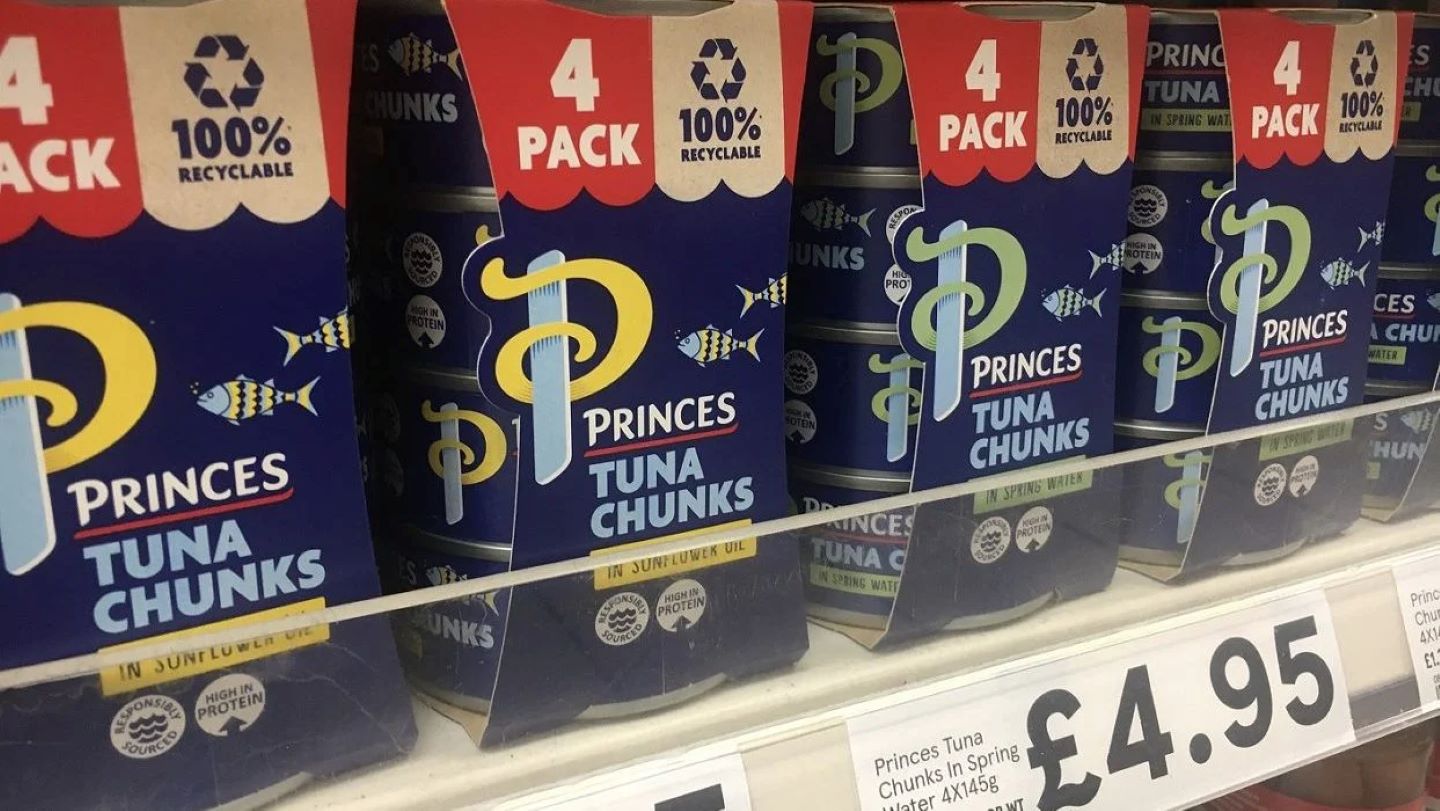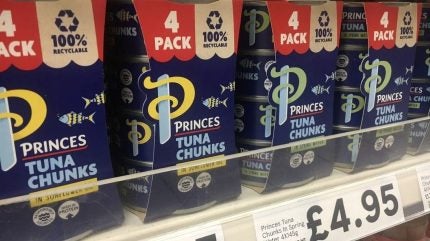

Italy-based Newlat has finally struck a deal to buy Princes, the UK food-and-beverage business it had been eyeing for months.
The transaction is set to create the newly named New Princes Group, a company described by the Italian business as “one of the leading multi-brand and multi-product food companies in Europe”.
But what might lie ahead for the new group, formed by the acquisitive Newlat and the slow-growth canned food and ambient drinks supplier Princes?
Last week, bakery, dairy and pasta company Newlat confirmed an agreement to acquire Princes for £700m ($894m).
The deal brought an end to a long-running takeover saga over the Liverpool-based company.
Rumours first swirled in January 2023 when Mitsubishi Corp., the Japanese conglomerate that acquired Princes in 1989, hired M&A advisers to sell the business.
Access the most comprehensive Company Profiles
on the market, powered by GlobalData. Save hours of research. Gain competitive edge.

Company Profile – free
sample
Your download email will arrive shortly
We are confident about the
unique
quality of our Company Profiles. However, we want you to make the most
beneficial
decision for your business, so we offer a free sample that you can download by
submitting the below form
By GlobalData
Then in December, Newlat, which already owns UK food manufacturer Symington’s, confirmed it was involved in the race to buy Princes, saying talks were at a “very advanced stage”. At this point, Sky News reported the asking price for Princes was around £400m.
However, in February this year, Newlat said it had submitted a new bid for Princes that accounted for softening demand and lower inflation in the UK’s “difficult market environment”. Mitsubishi rejected the new proposal and Newlat announced it had halted discussions.
A deal, though, has now been done. Newlat is putting up £650m from its existing resources and loans. The remaining £50m will come from the proceeds of the sale of shares in Newlat to Mitsubishi. When the deal is completed, Mitsubishi will become Newlat’s second-largest shareholder with 21.2% of the economic rights in the company and 15.1% of its voting rights.
Mitsubishi is a large group of businesses with divisions across sectors including energy, mineral resources and urban development. It has a presence in a range of agri-food sectors, including grains, oilseeds, feed and livestock.
However, Robert Lawson, managing partner at UK-based consultancy Food Strategy Associates, believes Mitsubishi decided to sell Princes as “UK food is not a focus for them”. He adds: “Selling this underperforming business allows them to deploy capital more effectively elsewhere.”
In the 12 months to the end of March 2023, Princes generated a loss attributable to its owners of £42.7m, against a profit of £17.2m a year earlier.
An impairment charge of more than £57.7m was central to Princes becoming loss-making during the period, accounts filed with Companies House, the UK’s business register, show.
Turnover stood at £1.74bn, against £1.44bn in the 12 months previous. Higher selling prices helped Princes’ top line, it said.
However, according to Prerana Manral, senior data analyst at GlobalData, Princes’ 2024 performance was impressive enough to convince the Italian company to get the transaction over the line.
When Newlat announced the deal for Princes last week, the company stated some financial numbers for the Napolina brand owner for the 2023/24 financial year.
The company said Princes generated a consolidated turnover of £1.71bn with “an adjusted EBITDA of £100.5m. The adjusted net profit reached £13m”. Unadjusted figures for EBITDA and net profit were not disclosed.
A source close to the matter said those profits may have proved to be the deciding factor for Newlat to bite the bullet on the deal. The source added it has not been uncommon in recent months for companies to walk away from a potential deal during negotiations, as Newlat did in the last year.
Lofty revenue targets
Newlat’s purchase is expected to bring New Princes Group’s annual revenue to circa €2.8bn ($3bn) and its adjusted EBITDA to around €190m.
In a call yesterday (4 June) discussing the business plan for New Princes Group, Newlat set out a target for the new company’s organic sales to grow at a 3% CAGR between 2024 and 2030. If that level of growth is achieved, revenue will reach €3.34bn, Newlat said.
However, the new company is aiming to generate €5bn in annual revenue by 2030. “Further contributions to growth may come from operational and commercial synergies between Princes and Newlat Food, while the target revenue of €5bn will be linked to the contribution of further M&A,” Newlat said.
Lawson says Princes’ performance has been unconvincing in recent years.
He said: “The Princes business is a leader in canned veg and baked beans, strong in tuna fish, strong in fruit juices and cordial and they have a joint venture in cooking oils. Their brands are rarely market-leading positions and often the business participates in branded food through licenced brands. The largest brand in the business is Napolina.
“How will the businesses fare? That depends on the level of change Newlat puts on the business. If things don’t change, the business will continue with its current long-term trajectory of slow decline in share and profitability. If Newlat embraces change for the business, or allows management to modernise skills and processes in areas such as revenue growth management and procurement we can see some recovery.”
Newlat also set out profitability targets for the combined business. In what the company called a “conservative scenario”, the new group’s profitability is projected to increase by 270 basis points, reaching an EBITDA of €317m and an EBITDA margin of 9.5% in 2030.
The group said the rise in profits would be “driven by commercial synergies, improved product mix, an increased contribution from proprietary brands and operating leverage”. It also projected “cost and integration synergies” of €36m, with additional “commercial synergies” potentially further boosting margin growth above 10% by 2030.
More deals on the horizon?
In March, Newlat said it was engaged “in four important dossiers, all strategically relevant for our group”.
At Food Strategy Associates, Lawson doubts Newlat will immediately look to expand its portfolio with more purchases.
“It will take a while for them to digest Princes, which is much bigger than the existing Newlat Group. The Princes businesses are likely to require some substantial investment to achieve their potential, so I think Newlat will pause for a while on the acquisition front.”
However, he adds: “Newlat has been highly acquisitive for a number of years and has already acquired Symingtons in the UK. They have launched some of these acquired brands such as Naked Noodles in their domestic Italian market and I expect they will do likewise with some of the Princes brands as well as pushing own-label products into a broader array of international markets where they have a commercial footprint.”
Newlat CEO Giuseppe Mastrolia said yesterday: “About future acquisitions, we have a list of names but, obviously, I cannot tell you which they are. What I can tell you is that we have a clear view about which kind of sector we need to increase the potential in terms of synergies on commercial, industrial, etc.
“We already started to have some conversations about our project that we stopped to leave room for these big acquisitions, but we are ready to restart very quickly.”

